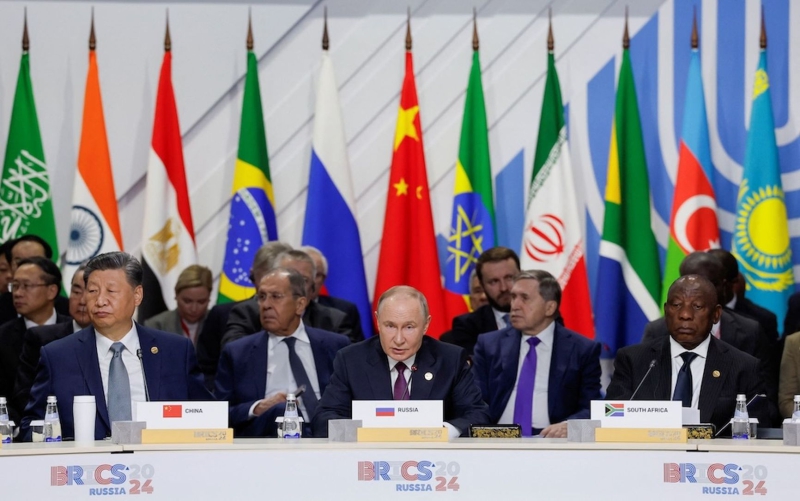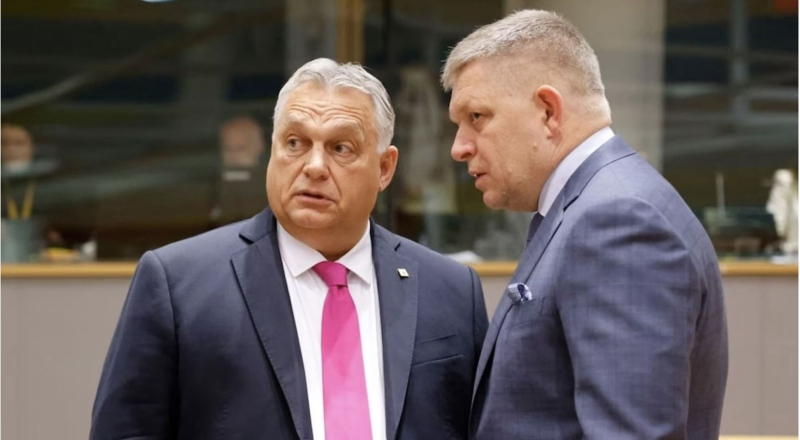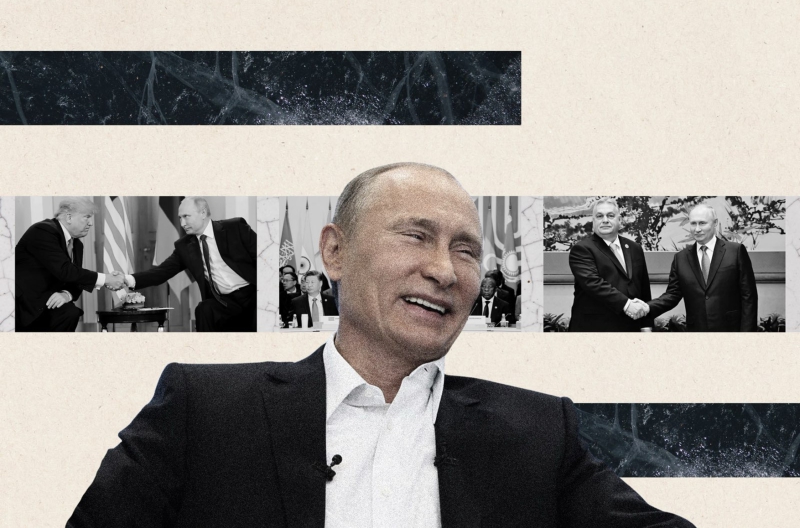In 2024, the third year of Russia’s full-scale invasion of Ukraine, Vladimir Putin visited a record 11 countries. Foreign figures also came to him: UN Secretary-General António Guterres traveled to Moscow, and in late December, Slovak Prime Minister Robert Fico met with Putin — then threatened to cut off his country’s electricity supplies to Ukraine. The Kremlin’s hopes now rest heavily on Donald Trump. However, if peace negotiations fail, Putin seems destined to remain a global outcast, says Anton Barbashin, political analyst and editorial director of Riddle Russia.
In 2024, Moscow reemerged on the global diplomatic stage. The BRICS summit, visits from the presidents of Hungary and Slovakia, and the UN Secretary-General’s trip to the country have forced even Putin’s harshest critics to concede that Russian diplomacy has achieved a public relations victory of sorts. But how substantial is this success? And why, after three years of war, is Putin increasingly receiving high-profile delegations in Moscow?

It is worth setting aside the trips of Russian delegations to post-Soviet states and their leaders’ reciprocal visits to Russia. No one expected countries dependent on Russia or those striving to maintain relations with Moscow to risk a diplomatic scandal by joining the Western diplomatic blockade. Russia's strategic partners — China, Iran, and North Korea — also fit into this category. Nevertheless, 2024 saw Putin’s international itinerary expand to 11 countries, his highest total since 2019.
Putin is not the only character in this story. In recent years, representatives of the Russian Foreign Ministry have been actively touring Africa. In the past year, Russia opened two new embassies on the continent, with plans for three more. Additionally, Russian cultural centers are continuously being established across Africa.
No one expected countries dependent on Russia to join the Western blockade of Russian diplomacy
But the most notable development is Moscow’s growing interaction with representatives of NATO countries, international organizations, and states that previously declared support for Ukraine or voted for pro-Ukrainian resolutions at the UN. This shift can be attributed to at least three key factors.
Anticipation of peace
The most significant catalyst for the restoration of diplomatic ties with Russia is the prospect of peace talks with Ukraine. These discussions are almost entirely tied to the upcoming presidency of Donald Trump, who has repeatedly stated his intention to broker an agreement between Moscow and Kyiv. Many countries are eager to participate in these negotiations, seeing them as an opportunity to benefit substantially from an end to the largest conflict in Europe since World War II.
Two of the leading European contenders for mediators are the same figures who traveled to the Kremlin in recent months: Hungarian Prime Minister Viktor Orbán and Slovak Prime Minister Robert Fico. Both leaders position themselves as opponents to a hardline approach regarding Russia, criticize Western sanctions policies, and openly express admiration for Trump. Both have also offered their countries as venues for potential peace talks. In the summer of 2024, Orbán managed to visit both Kyiv and Moscow.

Both Hungary and Slovakia are heavily dependent on Russian gas supplies. In 2024 Hungary imported over 7.5 billion cubic meters of Russian gas — with overall domestic consumption at around 8.5 billion cubic meters. In Slovakia, Russian gas accounts for just over half of domestic consumption, but until recently Russia supplied nearly 100% of the country’s energy needs. Slovakia is particularly vulnerable to the halt of Russian gas transit through Ukraine that went into effect on January 1, 2025.
Ending the war or reaching a truce in Ukraine would seriously simplify economic cooperation with Russia for both of these EU countries. In the event of success, Budapest and Bratislava could also reasonably expect substantial “economic gratitude” from Moscow for their mediation efforts. Both Moscow and European countries inclined toward cooperation with Russia believe that halting the war could lead to the lifting of sanctions — at least some of them — which would help state budgets and bolster the wealth of ruling elites willing to facilitate a truce.
Budapest and Bratislava stand to gain considerable “economic gratitude” from Moscow for mediating negotiations with Ukraine
In addition, Qatar, Turkey, and UN Secretary-General António Guterres have shown interest in mediating negotiations, even if Guterres’ visit to Moscow provoked notable outrage among Ukraine’s supporters. Meanwhile, some of the countries supplying weapons to Ukraine are also attempting to restore high-level contact with Russia. In November 2024, German Chancellor Olaf Scholz called Putin for the first time since December 2022.
So far, contacts between the leaders of these states and Putin have not led to any concrete movement towards a compromise between Kyiv and Moscow — let alone to the full restoration of peace. However, the gradual restoration of ties with Russia reflects an expectation of progress on this issue in 2025.
A tempting opportunity
It is clear that the primary driver behind the near-constant engagement of the “global majority” with Russia is the economic benefits of cooperation with Moscow. For states from Armenia and Georgia to India, China, and the UAE, the war in Ukraine has provided lucrative opportunities to profit — ranging from fully legal and transparent transactions involving Russia to schemes involving outright sanctions evasion.
Few anticipated that the Russian economy would withstand sanctions while simultaneously increasing military spending and offering additional incentives to its partners for the risks associated with such toxic cooperation. Still, as long as Moscow is willing and able to pay a premium for foreign goods and services, interest in doing business with Russia will continue to grow. By now, many companies have found ways to transport nearly anything into and out of Russia. Even the most comprehensive economic forecasts do not predict significant obstacles for Russia to maintain its current level of spending through at least 2026.
As long as Moscow is willing to pay, interest in doing business with Russia will continue to grow
Such pragmatism also explains the participation of a significant number of world leaders in the 2024 BRICS summit in Kazan. Neither Ukrainian nor Western diplomacy has been able to offer viable alternatives to the countries still actively trading with Russia. Moral arguments alone are insufficient to convince nations like India that doing business with Russia is wrong — especially when the beneficiaries of Russia's trade with the Global South often include Western countries themselves, which buy Russian oil or gas that is being sold on by Moscow’s partners.
Someone else's war
For much of the global community, the war in Ukraine is not seen as a challenge to the liberal world order or to any sort of international system based on law, but rather as a conflict among European powers taking place in Europe. Studies on the attitudes of Global South countries toward the war in Ukraine reveal that the vast majority of non-Western nations remain indifferent, feeling no obligation to take sides.
Western sanctions still leave their mark. Apart from Iran and North Korea, all states attempt to follow certain rules in order to avoid being hit with secondary restrictions. However, as practice shows, imposing sanctions is far easier than ensuring their enforcement. If Moscow is willing to engage with African states or to offer its capital to Gulf countries, these countries are unlikely to forgo the benefits, whether out of solidarity with Ukraine or of deference to Washington’s requests. Rather, experience shows that Ukraine often struggles to secure understanding from nations that benefit diplomatically or economically from cooperation with Russia.
Africa and the Gulf states are unlikely to sacrifice economic benefits either for solidarity with Ukraine or at Washington’s request
But does this mean Russian diplomacy enters 2025 as a clear winner, poised to secure stronger positions in the years ahead? In short, no.
First, not all countries are willing to follow Mongolia’s lead in ignoring the ICC warrant for Putin’s arrest. Even South Africa, a BRICS ally, has declined to invite the Russian president to the G20 summit — preferring to avoid the dilemma between detaining him and harming relations with Moscow, or allowing him to move freely and straining Pretoria’s relations with Western nations. Even Russia’s closest partners have refused to recognize the annexation of Ukrainian territory, and Putin’s quest for support has taken him to North Korea, a country Russia itself regarded as a pariah until recently.
Second, much of Russia’s current diplomatic momentum depends on the prospect of negotiations between Putin and Trump. If these talks fail and sanctions remain firmly in place, it will become increasingly difficult for Moscow to convince its partners to take risks on its behalf. At the same time, Putin’s European allies will have to accept the permanent loss of cheap Russian gas and prepare to rely more heavily on American LNG.
Finally, Russia’s diplomatic successes rely heavily on Moscow’s spending power. But the ongoing war continues to drain the Kremlin’s resources — including the funds it uses to circumvent sanctions. If in two or three years Russia finds itself forced to cut spending due to dwindling reserves, its friends and partners may begin to question whether it’s really worth maintaining ties with a toxic and increasingly impoverished nation.

